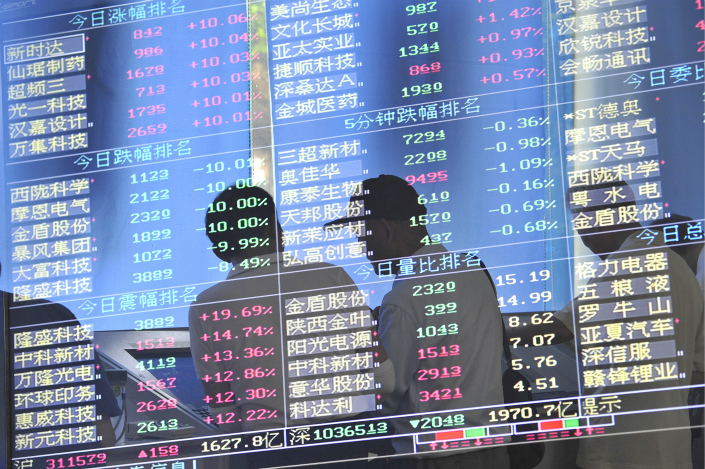Margin Calls Loom as Prices of Pledged Shares Plunge

Shares of over 10 listed companies have plummeted over recent month to levels that could trigger the forced sale of the stock pledged by their controlling shareholders as collateral.
The situation underscores growing risks in the loan business after regulators tightened their grip on the practice as part of a national deleveraging campaign.
Telecommunications solution provider Boomsense announced in a filing with the Shenzhen bourse Tuesday that some of its stock pledged by its controlling shareholder as collateral for loans has been subjected to margin calls by creditors due to a continued fall in the share price. The problematic shares account for 17.8% of the firm’s total.
When a margin call is triggered, the borrower must either deposit more cash or securities with the lender as additional collateral, often a brokerage, or sell the shares pledged to settle the loan. However, the forced sale of the pledged stock could lead the company’s share price to tumble further.
Boomsense, which closed at 7.17 yuan ($1.12) per share on Monday, has lost about half of its value since January. Its shares have been suspended from trading since Tuesday.
The company, listed on China’s Nasdaq-style Growth Enterprise Board, is just the latest of more than 10 listed firms whose controlling shareholders have come under similar pressure, according to Caixin’s calculations. The other companies include ventilation system supplier NanFeng Corp., high-tech firm Jiangsu Dewei Advanced Materials Co. Ltd., Jinlong Machinery & Electronics Co. Ltd. and Tianma Bearing Group Co. Ltd.
Pledging stock to borrow from brokerages was one of the most popular financing approaches used by major shareholders of Chinese listed companies. But the business has been contracting since the country’s regulators recently tightened requirements on financial institutions’ risk controls due to a spike in the number of margin calls sparked previously, a senior executive with an outlet of a securities firm told Caixin.
Brokerages have become reluctant to lend against pledged shares, charging high interest rates while granting loans that are much smaller than the market value of the pledged stock because “risks are rising,” she said. That has strained the financial chain of major shareholders of many listed companies, she added.
In an example that illustrates why brokerages have grown so jittery, China’s securities regulator has banned Western Securities Co. Ltd. from conducting stock repurchase deals for six months due to its flawed handling of a pledged-stock loan for embattled tech giant LeEco. The deal could cause the brokerage, based in the northwestern city of Xi’an, to incur losses of 439 million yuan.
In January, authorities published new rules governing pledged-stock loans, capping the amount of any stock on the A-share market that can be pledged at 50% of the company’s outstanding equity.
Contact reporter Fran Wang (fangwang@caixin.com)

- 1China Officials Dismiss Tax Hike Rumors After Tech Selloff
- 2Cover Story: How Gutter Oil Became a Prized Fuel for International Airlines
- 3Maersk Unit Takes Over CK Hutchison Panama Ports After Court Ruling
- 4Prominent Chinese Journalist Liu Hu Detained by Police in Chengdu
- 5China Provinces Set Cautious 2026 Growth Targets
- 1Power To The People: Pintec Serves A Booming Consumer Class
- 2Largest hotel group in Europe accepts UnionPay
- 3UnionPay mobile QuickPass debuts in Hong Kong
- 4UnionPay International launches premium catering privilege U Dining Collection
- 5UnionPay International’s U Plan has covered over 1600 stores overseas






